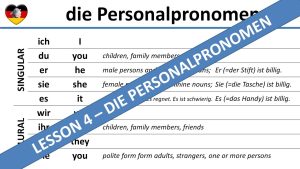
DEUTSCHE GRAMMATIK
GERMAN GRAMMAR
DIE PERSONALPRONOMENTHE PERSONAL PRONOUNS
SINGULAR
ich I
du you "du" is used to address family members, friends and children. Very frequently, fellow workers address each other using "du". You should not address strangers using "du". At official places, using "du" might offend people. So although the use of "du" is very widespread, it is always safe to use "Sie" (capital S!) when you're unsure which form to use.
er he "er" refers to male persons as well es male pets. Unlike English, which uses "it" to refer to nouns which do not refer to people or pets, "er" is the pronoun to be used when referring to a noun of masculine gender. In German, every noun has a gender (masculine, feminine or neuter) and the pronoun "he" has to be used for masculine nouns.
sie she "sie" refers to female persons as well es female pets. Unlike English, which uses "it" to refer to nouns which do not refer to people or pets, "sie" is the pronoun to be used when referring to a noun of feminine gender. In German, every noun has a gender (masculine, feminine or neuter) and the pronoun "she" has to be used for feminine nouns.
es it "it" is the pronoun to be used when referring to a noun of neuter gender. In German, every noun has a gender (masculine, feminine or neuter) and the pronoun "it" has to be used for neuter nouns.
PLURAL
wir we
ihr you "ihr" is the plural form of "du". It is used to address groups of people which you would address using "du" individually.
sie they
Sie you "Sie" is the polite or more formal version of "du" and also of "ihr", i.e. it is used to address one person (singular) or groups of people (plural). Please note that "Sie" is always written with a capital "S" at the beginning. "Sie" is not listed under "SINGULAR" because this personal pronoun always takes the plural verb form - no matter if it is used to address an individual person or more than one.
Listen to the personal pronouns in German:
The three pronouns „sie“ (=she), „sie“ (=they) and „Sie“ (=you) are pronounced the same.
Note that in German, the pronoun used depends on the grammatical gender of the noun we refer to, not the actual gender! For example, „person“ in German is „die Person“. It is a feminine noun, so we have to use „sie“ to refer to the noun „person“. Another example is „das Mädchen“ (=the girl) which is neuter (because of the ending „-chen“). So when we refer to the word „das Mädchen“, the correct pronoun is „es“ and not „sie“.


Watch these videos for more on the personal pronouns in German.
